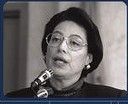Muslims in our Government: Azizah Al-Hibri
IT’S WORTH CONSIDERING
This is the sixth post in a series informing you about some of the Muslims who now hold key positions in our government.
Azizah Al-Hibri is a Lebanese-American with degrees from the American University of Beirut (1966), and the University of Pennsylvania Law School. She is now a practicing attorney specializing in securities and corporate law, a professor of law at the University of Richmond, the founding editor of Hypatia: A Journal of Feminist Philosophy,and the founder and executive director of KARAMAH: Muslim Women Lawyers for Human Rights. This organization is heavily funded by the El-Hibri Charitable Foundation established by her brother Ibrahim, who amassed a fortune through his business dealings with Saudi Arabia. Another major donor has been Saudi Prince Alwaleed bin Talal, who made the news after the 9/11 attack when his $10-million-dollar disaster relief check was famously rejected by then-New York City mayor Rudolph Giuliani after the prince suggested that U.S. policies in the Middle East had provoked the al Qaeda attacks.
Beirut (1966), and the University of Pennsylvania Law School. She is now a practicing attorney specializing in securities and corporate law, a professor of law at the University of Richmond, the founding editor of Hypatia: A Journal of Feminist Philosophy,and the founder and executive director of KARAMAH: Muslim Women Lawyers for Human Rights. This organization is heavily funded by the El-Hibri Charitable Foundation established by her brother Ibrahim, who amassed a fortune through his business dealings with Saudi Arabia. Another major donor has been Saudi Prince Alwaleed bin Talal, who made the news after the 9/11 attack when his $10-million-dollar disaster relief check was famously rejected by then-New York City mayor Rudolph Giuliani after the prince suggested that U.S. policies in the Middle East had provoked the al Qaeda attacks.
Through her lectures and writings, Al-Hibri has attempted to show that Islam is actually pro-women’s rights, pro-human righjts, and pro-democracy. She has gone so far as to claim that when America’s founding fathers (most notably Thomas Jefferson, who owned a copy of the Qur’an, and James Madison) sought to establish freedom of religion, they likely drew their inspiration from “the Islamic model of 1500 years ago”-specifically, “a Qur’anic revelation which says there shall be no coercion in religion.”
During the 1990s, Al-Hibri served on the advisory board of the American Muslim Council when it was under the leadership of Abdurahman Alamoudi, who was later convicted and imprisoned on terror-related charges. In 1998 Al-Hibri came to Bill Clinton’s defense during the Monica Lewinsky sex scandal, writing that “Had the President [when he perjured himself] been testifying in an Islamic court, he would not have been placed in this terrible predicament in the first instance.” She went on to point out that had Sharia Law been applied, the case against Clinton was weakened by the fact that the required four witnesses were lacking. Clinton’s accusers, “who violated his privacy and broadcast his behavior,” would themselves have been considered “guilty” and subject to punishment.
In early 2001, Al-Hibri traveled to the Afghanistan-Pakistan border where she condemned the Western press for “sensationalizing” Taliban atrocities in order to “attack Islam.” A month after 9/11, she cautioned the U.S. against striking militarily against al Qaeda and Taliban targets during the holy month of Ramadan, lest America offend “the sensitivities of the Muslim world” and thereby “give bin Laden one more tool to argue to the Muslim world that the United States is disrespectful of their religion.”
AS I SEE IT
If there was any doubt as to her goal of “sanitizing” Islam for Western consumption, it was removed in 2004 when she addressed a United Nations seminar on “Islamophobia.” She claimed she was bewildered as to why anyone would ever be critical of Islam since it was Islam’s holy book that gave “dignity to the children of Adam,” and whose doctrines encouraged freedom of religion, freedom of thought, and democratic, consultative government. She insisted that the very concept of the separation of church and state came from Islam, whose early leaders were forbidden to adopt any one school of political thought. (Anyone who knows anything about Islam knows how ridiculous her claims are.)
She has written that “Islamic fiqh [jurisprudence] is deeper and better than Western codes of law” and that Saudi Arabia’s criminal-justice system is superior to its “impersonal and powerful” American counterpart. She has praised Islamic Law for ensuring that capital punishment “is not imposed unless due process has been observed in a fair trial, and extenuating circumstances were fully considered.” By contrast, Al-Hibri has called for a moratorium on capital punishment in the United States, claiming that its application is full of “inequities and biases” that “disproportionately” affect “minorities.”
On June 7, 2011, President Obama appointed Al-Hibri to a two-year term on the U.S. Commission on International Religious Freedom, a bipartisan federal panel tasked with reviewing the circumstances surrounding violations of religious freedom internationally, and making policy recommendations to the President, the Secretary of State, and Congress.
This devout Muslim and outspoken critic of America and its legal system is someone Barack Obama thought would make a good government crusader for religious freedom. For additional information on Azizah Al-Hibri, click here.
ON THE LIGHTER SIDE
The only time the world beats a path to your door is when you’re in the bathroom.





Leave A Comment